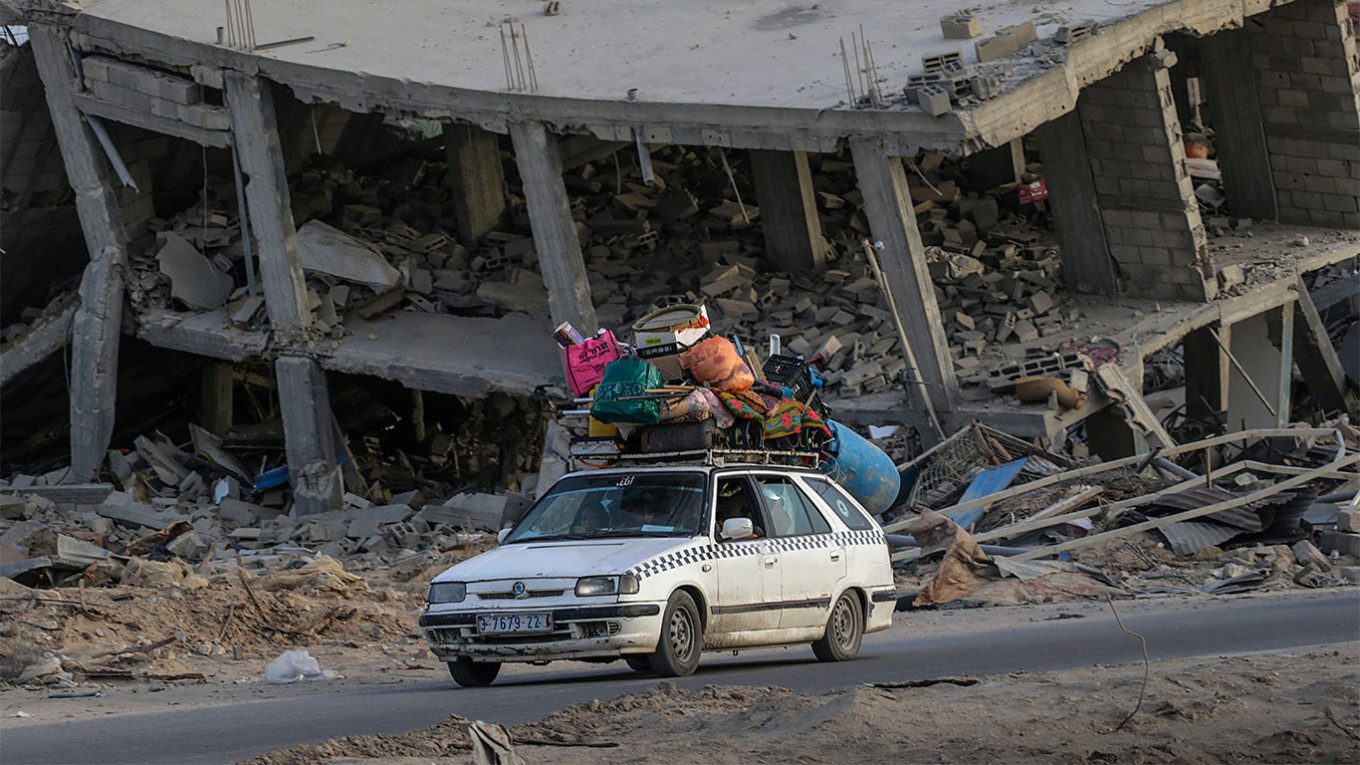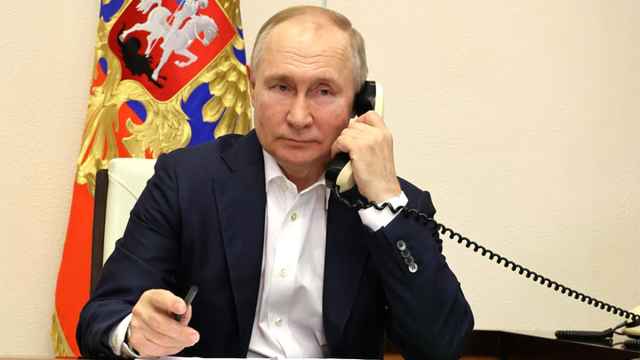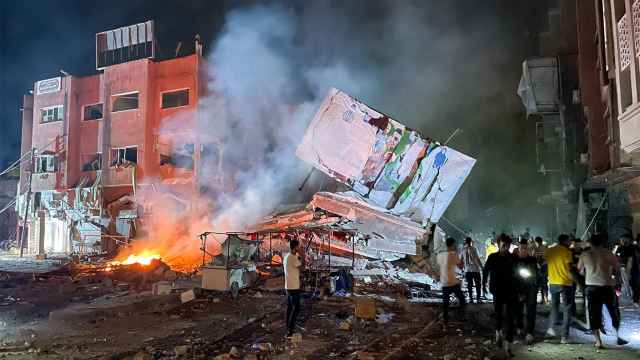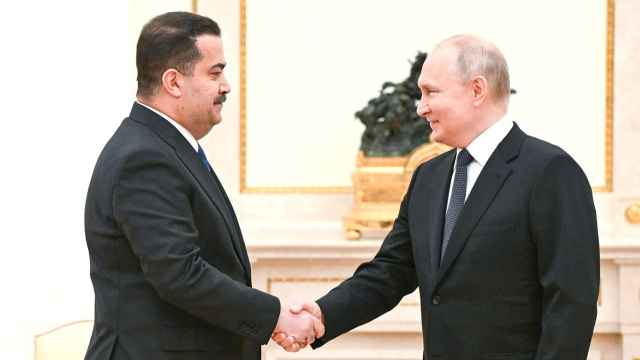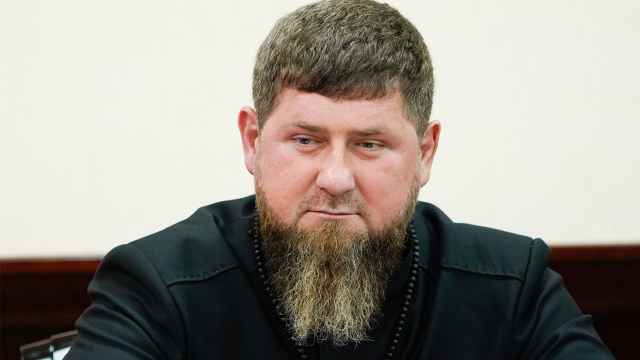Hamas’ deadly October 7 attack against Israel and the subsequent assault on Gaza by the Israeli Defense Force (IDF) has ostensibly divided the world into two adversarial camps: those who support Israel and those who support Palestine. Russian liberal media — most of which fled the country to escape wartime censorship and persecution — have almost unanimously adopted a pro-Israeli stance, portraying Israel’s response to Hamas’ attack as wholly necessary and justified, all the while glossing over context that is crucial for understanding the latest outbreak of hostilities.
On Russian-language social media, the geopolitical players in the conflict have been polarized — with an “axis of evil” and “barbarians” on the one side, and on the other, representatives of “European civilization.” Any discussions of October 7 usually avoid delving into the broader Middle Eastern context.
This black-and-white, emotionally charged perspective was widespread across many Russian liberal media outlets during the October 7 attack and in the days that followed, when the atrocities perpetrated by Hamas came to light. To some extent, this is understandable and even human. However, it soon became clear that many independent Russian media outlets were simply echoing statements made by the Israeli government.
Since the start of the crisis, Israeli officials have invoked biblical dichotomies between “children of light” and “children of darkness” in describing their country’s war with Hamas. They depict Israel as the righteous heir to the ancient Hebrews and their divinely sanctioned battles against “wicked” nomadic tribes, thus framing the contemporary conflict in moral terms of “good” versus “evil.”
Using these narratives to justify military action against the small coastal enclave of Gaza is nothing new. For decades, such statements — especially from the far-right coalition currently in power — have been used to back Israeli expansionist policies. Since October 7, rhetoric that was once meant for a local audience has now gained international attention. And among Israeli officials, this rhetoric has escalated into alarming calls for Gaza’s full-scale destruction.
But instead of examining the complex history and politics at the heart of the crisis in Israel and Palestine, Russian liberal media have doubled down on a simplistic framing. Venerated liberal pundits like Yulia Latynina or Leonid Gozman pontificated about “flourishing free democracies” (i.e. Israel) that “find themselves defenseless against the new barbarians” and the “axis of evil” — that is, Russia, Iran, North Korea, and radical Islamic militant groups. TV Rain presenter Yekaterina Kotrikadze mocked climate activist Greta Thunberg’s support for Palestine, arguing that when it comes to the war in Gaza, “everyone knows who the barbarians are, and who represents civilization.”
Even experts from The Insider, an independent investigative news outlet, have succumbed to a reductive narrative of “good” versus “evil.” They describe Western officials who support Israel as the “responsible adults” in the room while dismissing international organizations that recognize Israel as an apartheid state as “propaganda platforms” that are biased toward the “Muslim-Arab bloc.” Zeev Hanin, The Insider's chief political analyst, questioned these organizations’ commitment to human rights and even downplayed the existence of Palestinian nationhood and the humanitarian crisis in Gaza by placing these terms in quotation marks. The fact that prominent Israeli human rights groups share the view that their country is an apartheid state was conveniently omitted in his analysis.
Double standards persist when Russian liberal media report casualty figures from Gaza’s Health Ministry. They emphasize that Hamas controls the ministry and therefore the figures cannot be trusted. “How can one cite a source called the Ministry of Something-or-Other of Hamas?” Ekho Moskvy host Ksenia Larina asked during a livestream. These pundits do not seem to realize that the ministry’s data has proven to be reliable in the past, nor do they engage with the fact that reputable Western news agencies regularly cite Gaza Health Ministry death toll data in their reporting.
Meanwhile, liberal Russian media fail to inform their audiences that Israeli sources can also suffer from bias. The IDF has been caught lying, obscuring data, as well as changing its version of events when confronted with evidence from witnesses or the press. While liberal pundits might briefly mention Israeli military censorship, they do not examine its impact on Israeli democracy or how it shapes the public’s perception of the war. This lack of scrutiny is particularly concerning as Israel and Egypt prohibit international journalists from entering Gaza, where at least 105 reporters have been killed since the start of the conflict in October.
At the same time, Russian liberal news outlets almost exclusively platform pro-Israeli experts, while Palestinian perspectives and Israeli anti-war voices are noticeably absent.
This creates the false impression that the Israeli public is unanimous in its support of the government’s handling of the military operation in Gaza. By focusing solely on these views, the media obscures legitimate criticism of Israel and its dangerous shift toward militant nationalism, which is evident in lynching attempts and persecution of dissenters. This one-sided approach in coverage also marginalizes opinions advocating for non-violent solutions.
Reporting by Russian liberal media regularly conflates Palestinian citizens with Hamas. During a discussion on TV Rain about pro-Palestinian protests in Europe and the United States, political analyst Vladimir Pastukhov said that “when we say ‘Palestinians,’ we mean ‘Hamas,’ and when we say ‘Hamas,’ we mean ‘Palestinians.’ Let's not deceive ourselves.” The TV Rain host, Kotrikadze, agreed. Reducing the diverse spectrum of pro-Palestinian activism by casting them all as Hamas supporters — and equating all Palestinian people with Hamas — represents a profound intellectual lapse.
The framing of the war in Gaza by Russian liberal media as solely a confrontation between Israel and Hamas is yet another problematic aspect of their coverage. Not only does it ignore the unprecedented humanitarian crisis that has emerged as a result of the conflict, it also ignores how the IDF regularly targets civilians and civilian infrastructure, crippling the medical system, destroying residential districts, and erasing centuries-old mosques.
These actions do not reflect a conflict merely between a military force and a terrorist group. Israel’s insistence — which is parroted by Russian liberal media — that Hamas has embedded itself among civilians and is using them as human shields fails to justify the tens of thousands of women and children who have been killed in Israeli attacks.
Moreover, the conflict is asymmetrical, pitting a modern, heavily equipped military force against what is essentially a cobbled-together militia. It is also economically lopsided. Israel has the 28th-largest economy in the world, while Gaza is a region plagued by staggering unemployment and poverty, a problem compounded by Hamas’ corruption. Eighty percent of the population relies on international humanitarian aid — and even before the current humanitarian crisis, Gaza experienced severe shortages of essential goods.
Failing to explain Israel’s outsized role in perpetuating this asymmetry leaves viewers and readers unable to understand the true nature of the conflict. Israel’s blockade of Gaza is cited by both the World Bank and the UN as the main reason for the small enclave’s dire living conditions. An already grim situation is further exacerbated by Israel’s offensive, leading to starvation and mass displacement.
Lastly, Israel’s role in strengthening Hamas cannot be overlooked. As part of his strategy to weaken the Palestinian Authority and divide Gaza from the West Bank politically and economically, Prime Minister Benjamin Netanyahu allowed Qatari funds to reach Hamas. Bezalel Smotrich, now Netanyahu’s finance minister, openly described Hamas as an asset and the Palestinian Authority in the West Bank as a burden. By empowering Hamas, Israel has hindered progress toward the establishment of an independent Palestinian state.
The framing chosen by Russian liberal media erases this crucial context. Notable exceptions include Meduza, which featured an interview with the Israeli historian Benny Morris, and the youth news website Doxa, which faced backlash from liberal voices for consistently providing the historical and political background to the October 7 attack and the subsequent escalation of the crisis.
The frustrating presentism that ignores historical context and treats each new episode of violence in Palestine or Israel as an isolated incident obscures the systemic nature of Israeli occupation. It silences the ongoing struggles of Palestinians living under apartheid or blockade, as well as the toll that this cycle of violence ultimately takes on Israeli citizens.
Where does a discourse devoid of historical and political context leave us? It sets us up to view events as part of a perpetual clash of East and West, “barbarians” against “civilization,” and “good” versus “evil.” Attacks like the one on Oct. 7, viewed outside a historical lens, are akin to natural disasters — unforeseeable and inevitable. This perspective fosters a hopeless, bloodthirsty worldview, refreshing an endless cycle of violence. A narrative that erases the history leading up to October 7 guarantees that such atrocities will be replayed over and over, ensnaring everyone in an endless loop of recurring catastrophes.
Understanding and analyzing the causes that led to these atrocities does not mean condoning the actions of the groups that orchestrated and committed these horrific crimes. However, without this analysis, no meaningful discussion about the future is possible.
A Message from The Moscow Times:
Dear readers,
We are facing unprecedented challenges. Russia's Prosecutor General's Office has designated The Moscow Times as an "undesirable" organization, criminalizing our work and putting our staff at risk of prosecution. This follows our earlier unjust labeling as a "foreign agent."
These actions are direct attempts to silence independent journalism in Russia. The authorities claim our work "discredits the decisions of the Russian leadership." We see things differently: we strive to provide accurate, unbiased reporting on Russia.
We, the journalists of The Moscow Times, refuse to be silenced. But to continue our work, we need your help.
Your support, no matter how small, makes a world of difference. If you can, please support us monthly starting from just $2. It's quick to set up, and every contribution makes a significant impact.
By supporting The Moscow Times, you're defending open, independent journalism in the face of repression. Thank you for standing with us.
Remind me later.


